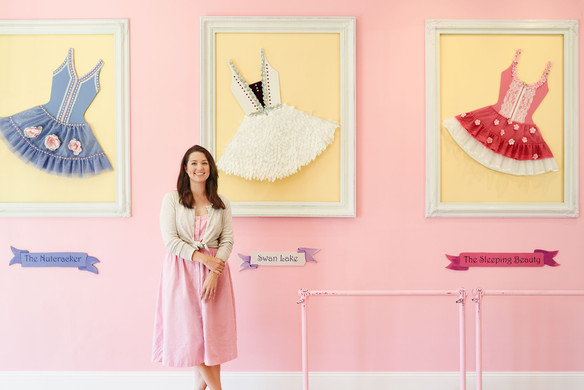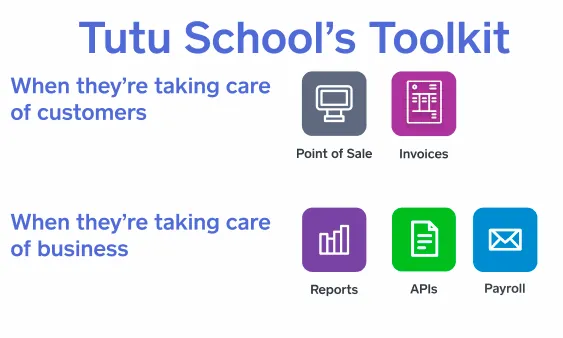Table of contents
Genevieve Weeks is the founding director and owner of Tutu School, a ballet school made for children. After opening her first studio in San Francisco in 2008, Genevieve has grown the business to 34 franchise locations across the country. Here’s the story of how she manages a successful franchised business, as told to Square editor Alise Bailey.
Square: What inspired you to start your business?
Genevieve: I was still dancing professionally when I got the idea for Tutu School. In between gigs and rehearsals, I was teaching at a ballet school and they had put me in charge of the preschoolers. I really fell in love with teaching that age group — it’s such a formative, magical time. I was drawn to it.
From a business perspective, the classes for those age groups were always full, but no studio really catered to the needs of tiny dancers. A few months later, my husband and I found a studio space in San Francisco and launched the first Tutu School in 2008. It took off really quickly — we opened a second location in Marin, just across the bridge, a year and a half later, and began franchising in 2014.
How do you differentiate yourself in the market?
There was nothing about traditional dance programs that catered to younger ages. Tutu School focuses specifically on little dancers, which ensures that everything — from curriculum and teacher training to the studio design and the class schedule — only focuses on their needs.
Why did you decide to franchise Tutu School?
After we opened our second location, we realized that Tutu School could be successful in many different communities. But there was no way that I could do that for myself.
Living in San Francisco, and being surrounded by venture capital and outside funding, I didn’t want to take funding. I wanted to maintain control over the vision, over the space, so I started looking at franchising.
We ultimately decided to franchise because it allows other owners to become your investors, and they become invested in the day-to-day operations of the business. Our owners share Tutu School in new communities that I wouldn’t be able to reach alone. When I first started, we franchised to get into new locations, but now we have this community of entrepreneurs — and that community has really become the best part of it.
How does that community manifest?
We made a conscious decision to franchise versus licensing. I didn’t want to just give people a brand — we’re really involved in the school — they get everything from us — from the launch program and training to ongoing support.
We have an internal platform called Twirl that we use for training and as a hub to connect with other owners. Otherwise, we have regular calls between owners and with us. We distribute monthly tools to keep everyone connected. There shouldn’t be any guesswork — we’re all constantly evolving and growing together. We also have an owners summit annually.
How have you learned to delegate?
I would like to think that it’s a skill that I’ve mastered, but I think, more accurately, it’s a skill I’m working to refine. I’m lucky to be surrounded by really great people that understand and believe in the brand.
A big part of successful delegation is having the proper structure for roles and teams. Every 6 to 12 months, we restructure and streamline our chain of command (our chain of communication) so everyone knows where things should be directed and sent.
Each week, I look at my calendar and see what things I can hand off and entrust to someone else. I usually find that when you create a line of open communication, then the actual act of handing some things off — things I previously wouldn’t have dreamt of sharing — is something people are really grateful for. And they can sink their teeth into their projects that they wouldn’t have if I hadn’t delegated them. It’s a growth opportunity for everyone.
What is your day to day like?
One of the reasons I was excited to start Tutu School (before I had kids) was having flexibility in my work-life equation. And that is one of the things I feel really lucky about. It’s so much work, but I can choose when that happens. A huge advantage of being your own boss is being able to figure out what works for you.
Each day, I usually try to squeeze in some sort of workout. I often get great ideas and think more clearly when I get some endorphins.
I have a ten-year-old and five-year-old twins, so in between school drop-offs and pickups, I’ll put aside time to do whatever the company needs. Sometimes that’s calls with owners to strategize, or talking to potential owners, and we also have three corporate locations that we own — a lot of my day is making sure those locations are running smoothly and setting a great example.
I think one of my biggest challenges is making sure that I’m spending enough time on the things that really get me going. I notice that when I don’t get enough time focusing on them, I really miss them. It’s important to keep up on your passion projects.
What role has technology played in your growth?
It’s been huge. Dance schools have really lagged in the technology space. Registration and processes were so old-fashioned — everything was on paper. There weren’t a lot of systems in place that we could turn to. So we developed our own proprietary software for classes, bookings, and payments.
That’s been a huge benefit for us. When we decided to start working with Square and use the Square API, we could really adjust our software in a way that was exactly what we needed.
We primarily use Square Invoices — we switched pretty early on to monthly membership, and the invoicing capability has been huge for us, since most of our revenue is recurring monthly tuition payments.
The students are so young, it’s a much better fit to have monthly tuition payments. It allows families to be comfortable starting ballet, and they know that if their child wants to take a break, it’s not a big deal. Traditionally, parents would pay for six months or a semester at a time — providing that level of flexibility brings us more students in the long run.
We have all these locations and we’re able to stay really connected through online groups, through our online systems, we all feel connected and tapped in — we’re able to grow and evolve together instead of being silos.
What’s your advice to aspiring entrepreneurs?
Be smart about your time, delegate, but don’t be afraid to keep doing what you’re passionate about. You don’t have to hand everything off. You can make a conscious decision to hang on to what you love.
One of the things I wish I’d kept in mind (whatever stage of business you’re in) is having a growth mindset. There’s no downside — even if you’re in one location, streamline processes and procedures, write down what you need to know, and formalize everything. Make sure everything is codified and well thought out.
This makes your business run more smoothly, so if you do expand, that information is always there. When we decided to franchise, we had to press pause and do that for a bit.
How do you see your business growing in the next five years? What’s next for Tutu School
We’ve been in the growth stage for a while now — more and more owners are finding us. I love that — it means people are passionate about us. There are some exciting opportunities on the horizon, but we’re not exactly chasing after them. We’re working on making sure the backend is as smooth as possible for our teachers, staff, and owners. I love that we grew quickly because now it feels like we can take a breath and focus on fine-tuning things.
You can find Tutu School throughout the U.S., and follow along on its journey online.
Running a business like Tutu School is no easy feat, but Square is here to help. We have all the tools you need to start, run, and grow your business, whether you’re selling in person, online, or both. And we’ve made all our tools to work together as one system, saving you time and money — and making decisions easier. So you can get back to doing the work you love and focusing on whatever’s next. See how Square works.
![]()















